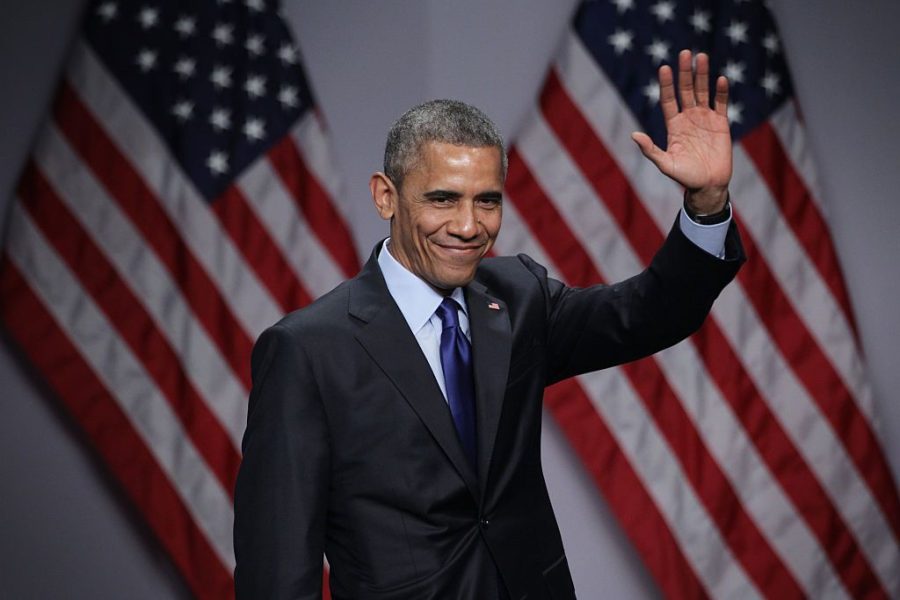The most shocking recent U.S. elections
April 5, 2022
Electoral politics are fascinating. No matter how much political pundits attempt to predict political results and no matter how many polls are conducted forecasting a specific outcome, there are often many electoral surprises that shock the nation. Whether it be from amazing overperformances or surprising incumbent defeats, here are some of the most shocking U.S. election results of the past twenty years.
Barack Obama wins Indiana in 2008
Barack Obama was a uniquely successful candidate. As a freshman senator hailing from the Midwestern state of Illinois, he appealed to many working-class individuals (both white and non-white) who were disillusioned with Republican leadership and the Bush administration. This allowed him to handily win key Midwestern states like Michigan, Ohio, and Wisconsin: states where winning working-class voters is crucial. However, his Midwestern appeal was so strong that he was able to pull off a shocking victory in Indiana, a state that had not voted for a Democratic presidential candidate since 1964. Through extremely strong margins in Indianapolis and modest losses in the usually-heavily Republican rural areas, Obama was able to defeat John McCain in Indiana by 1% of the vote. However, in his 2012 re-election campaign, Obama failed to recreate this Midwestern miracle, losing the state to Mitt Romney by 10% of the vote.
Lisa Murkowski wins a write-in campaign in 2010
In most scenarios, if an incumbent loses a primary election against a challenger, their political career is over. This, however, was not the case for Alaska Senator Lisa Murkowski. Due to the wave of fiscal conservatism that was brought forth in 2010 by the Tea Party movement, Murkowski narrowly lost her primary against challenger Joe Miller, a Tea Party supporter.
Nevertheless, even though she accepted the primary result, she was not ready to surrender her Senate seat; instead, she mounted a write-in campaign, appealing to center-right voters and Native American voters (many of which are in Alaska). With the help of ads and flyers teaching voters how to write her last name, Murkowski was able to convince more than 100,000 Alaskans to write-in her name on their ballots, narrowly winning the seat against Joe Miller. This win is particularly impressive as she became the first person since 1954 to win a Senate election with a write-in campaign. Through convincing centrist and politically-neglected voters, Murkowski achieved the impossible and retained her seat despite a primary defeat.
Joe Manchin wins the West Virginia Senate Race in 2018
Joe Manchin, a prominent senator from West Virginia, characterizes himself as a “West Virginia Democrat not a Washington Democrat.” Perhaps the most conservative senator in the Democratic caucus, Manchin is proudly pro-gun, pro-fossil-fuel, pro-life; characteristics that place him in direct opposition with most of the Democratic platform. However, this isolation from the Democrats is what continuously allows him to win in West Virginia, an ultra-conservative state in which Hillary Clinton received a mere 26% of the vote in 2016. Despite the conservative nature of the state, Manchin’s political independence allowed him to narrowly pull off a win in the 2018 midterms against Republican Patrick Morrisey, defeating him by 3% of the vote.
Tom Daschle loses against John Thune in 2004
Congressional leaders almost always face little contention in their re-election campaigns; due to their electoral strength and high profile, it would simply be too difficult for members of the opposing party to mount serious campaigns against them. This general rule, however, did not come true for Tom Daschle, the Senate Minority Leader, in his 2004 re-election campaign.
Although Daschle was a high-profile fighter of the Bush Administration valued by the Democratic caucus, he still received a credible challenger in Republican John Thune, a popular former U.S Representative of South Dakota’s sole congressional district. After immense campaigning, Thune defeated Daschle by a mere 4,000 votes, marking a huge defeat for national Democrats. This election showcased the danger of choosing congressional leaders hailing from competitive seats, exacerbating the trend of electoral safety becoming an important consideration when selecting congressional leadership.
AOC wins primary race against Joe Crowley in 2018
Although Tom Daschle lost his seat against a member of the opposite party, in some cases, congressional leaders can also be defeated by members of their own party through primary elections. This scenario is precisely what happened in the notorious 2018 primary for New York’s 14th Congressional District.
Joe Crowley, the Chair of the House Democratic Caucus and the representative of New York’s 14th Congressional District, was deemed by many to be too moderate for the seat; in this district, Hillary Clinton received 77% of the vote. Alexandria Ocasio-Cortez, a waitress and campaigner for Bernie Sanders, challenged Crowley for the seat, claiming Crowley did not properly represent the interests of the district. Crowley declined to participate in a debate with Ocasio-Cortez.
In a shocking victory, Ocasio-Cortez defeated Crowley in the Democratic primary with 56% of the vote, a surprisingly comfortable victory, considering Crowley was heavily endorsed by national Democrats. Considered by many to be the biggest upset in the 2018 midterms, AOC’s victory showcased the electoral growth and power of progressive politics and lawmakers.


